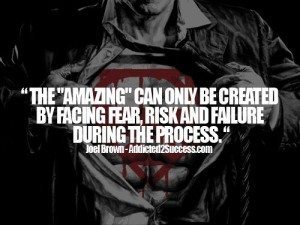Startups
6 Surprisingly Simple Strategies To Turn Fear Of Failure Into Business Success

Has it ever happened to you?
You’re about to do something important, and suddenly you’re struck with this sickening, pounding feeling just above your stomach?
It’s nauseating. You can’t breathe; you just can’t get enough air. Pressure sits on your shoulders and you just don’t know where it is coming from.
Or do you?
This paralyzing fear appears every time you plan on doing something outside of your comfort zone or if you’re not sure what will happen, no matter how banal the task may be.
But mostly, you’re afraid you’re wrong about yourself.
Maybe that entrepreneurial aspiration of yours is the fruit of an illusion that you can succeed. Maybe your ideas are ridiculous, and everyone is waiting for you to crash. Maybe you’re just a fool, and this fantasy of being an entrepreneur is just that, a fantasy.
“There is only one thing that makes a dream impossible to achieve: the fear of failure.” – Paulo Coelho
You are afraid to fail, and this fear suffocates you, has control over your life, and threatens your business success.
What if I revealed a few ways to take back control of your life? What if I told you that proven strategies could turn your fear of failure straight into business success? Isn’t that exactly what you need?
But before we look into those strategies, let’s see where your fear of failure comes from.
Of course you have a fear of failure. You went to school, right?
We usually fear failure when we’re about to do something for the first time or when we get different results each time we try, like when you call someone. We normally don’t fear failing at tasks we’re well accustomed to.
Please be aware; you’re not born with low confidence or fear of failure. Your fear of failure is an acquired emotion, acquired in your early youth and especially your school years.
What is the only thing that is rewarded in school? Giving the right answer the first time.
Giving the wrong answer is certain to lead to punishment and humiliation from peers, teacher’s disapproval, discipline, and possibly lower grades. Consequently, at the end of your schooling years, you’re effectively trained to be afraid to fail.
Yet, acquiring your fear of failure is actually a good thing. It does not belong to you like your eye color; this means you can lose it again!
With fear of failure, you get more than you bargained for. Humans have many fears to cope with. Depending on who you ask, you will get a list of 15 to 20 types of fear.
The fear of failure is a nasty thing because it actually combines a variety of different fears.
The most common fears found within fear of failure are the following:
1) Fear of embarrassment
This is the fear of failing in front of others.
2) Fear of being judged
This fear is based on our need for approval, which we developed in our childhood.
3) Fear of rejection
This fear is based on personalizing what others do or say about us.
4) Fear of vulnerability
This fear is based on our fear of getting hurt if we open up to others and expose our true inner selves.
“Everything you want is on the other side of fear.” – Jack Canfield
The combination of these fears can paralyze you. It makes you hesitant to take action. But it doesn’t have to.
Use your fear of failure to become super successful.
No matter what your intention is, maybe it’s to complete a challenging project at work or start your own business. Fear of failure can paralyze you, hold you back, and put your emotions in control.
But you can take back control by embracing fear as a growth tool.

Top professional athletes and entrepreneurs are not immune to the paralyzing effects of fear of failure, but they have learned to handle it with a little outside help.
Even better, the strategies used to battle fear of failure also have a direct positive impact on how you approach your professional life.
They make you amazingly focused and help you do business feeling supercharged.
In my career of over 10 years coaching top professionals in Europe and North America, I have used a variety of strategies to help my clients overcome their fear of failure.
So let me show you how you can overcome it too.
Combine the following six strategies to create your own strategic success plan:
1. Get crystal clear on your goals
Write down your goals and what you want to achieve in the next 12 months, but sub-divide them into smaller, easier, achievable goals, and be as precise as you can be.
If you don’t know where you want to go, you won’t know how to get there. That will confuse you and make you fearful.
But knowing where you should go gives you confidence.
Every goal achieved is a success and makes you feel successful.
2. Identify the obstacles preventing you from achieving your goals
Contrary to most beliefs, obstacles are not a bad thing as long as you can identify them. If you know what your obstacles are, then you know how to remove them; e.g., you have more to do than you have time.
One possible solution would be outsourcing.
Eliminating that obstacle between you and your goal means clearing the way toward your goal and therefore toward success. Knowing your enemy (obstacle) gives you confidence.
So make a list of your obstacles, and your fear of failure will decrease significantly.
“I learned that courage was not the absence of fear, but the triumph over it. The brave man is not he who does not feel afraid, but he who conquers that fear.” – Nelson Mandela
3. Plan how to overcome your obstacles
Write out exactly how and when you will overcome your obstacles. Not only does this create a plan to follow, but it puts you into a positive emotional state.
Since your brain cannot attend to opposite signals simultaneously, it cannot maintain fear of failure any longer.
This puts you back in control.
Your fear will have passed by now.
Plus you have a blueprint that leads directly to success (which should be part of any good business plan anyway).
4. Embrace choices
If something doesn’t work out as expected, don’t see it as a failure, see it as a conclusion to shift into a different direction that offers another opportunity for a successful outcome.
Business means constant change, and adapting is not a sign of failure but rather good business sense.
5. Celebrate
Celebrate not only big, but small achievements.
Again, you focus on the positive the success you just experienced and your brain cannot attend to opposite signals.
So you will face your next task less fearful. Plus, if you can’t have fun working, what’s the point of doing it.
And if you should run into sudden obstacles, don’t panic.
6. Breathe
When you’re about to enter a situation you fear, you tend to draw shallow breaths.
Deep breathing will reduce your anxiety.
It also increases blood circulation and oxygen to the heart and brain. It removes muscle tension too, which allows you to move easier and gain confidence.
Deep breathing releases endorphins that create natural highs and easy sleep.
You will be calmer, and a calm mind moves toward control.

Yes, you CAN turn your fear of failure into business success. Aren’t you tired of being a slave to your anxiety attacks?
Isn’t it exhausting to feel defenseless, hopeless, and afraid of failure for no reason? Don’t allow your fear and anxiety to hold you back and render you paralyzed in your business affairs.
This is not you. You know that you can do better than that!
You can take back control of your life, and your days of unexplained anxieties can end today.
Set big goals, chase your dream, be happy, and celebrate. Create your own success story.
What are you waiting for?
Shift Your Mindset
10 Powerful Traits Every True Thought Leader Possesses
In a world saturated with noise, thought leadership is the quiet power that shifts paradigms.

Thought leadership is more than just having strong opinions. It’s the ability to influence, inspire, and guide others by sharing original insights, innovative ideas, and deep domain expertise. It’s about sparking change, not just talking about it. (more…)
Startups
The Young Man’s Guide to Creativity: 10 Daily Habits to Improve Your Creative Mind
10 daily habits you can put into practice right now to improve your creativity

When I was 22 years old, I became a Top Writer on Medium.
It’s not an easy path. I lived in the Philippines and had never received a penny after writing over 100 digital articles. But I treated it like practice. If I couldn’t get other people to read my work for free, why would they trust me? (more…)
Startups
If You’re Not Reinventing Yourself, You’re Falling Behind! Here’s What To Do
Reinvention is the secret weapon of high performers.

Reinvention is the secret weapon of high performers.
Most careers follow a predictable script. You start at the bottom, climb the ranks, and eventually settle into something resembling stability. But the people who make the biggest impact, the ones who don’t just play the game but change it, break that script. They evolve. They shift. They reinvent. (more…)
Startups
The Silent Killer of Startups: This Might Be Draining Your Profits
If you are careless in managing your inventory, it can lead to a sudden depletion in cash flow

There are several issues in a startup, but if you are really careless in managing your inventory, it can lead to a sudden depletion in cash flow. Old, broken, and misplaced stock wastes space and profits. If inventories and storage aren’t managed properly, it hardly ever works.
-

 Success Advice4 weeks ago
Success Advice4 weeks agoStephen Covey’s 8 Leadership Habits That Will Change How You Lead Forever
-

 Personal Development4 weeks ago
Personal Development4 weeks agoWant to Change the World? Start by Sharing Your Knowledge
-

 Business4 weeks ago
Business4 weeks ago7 Legal Situations Every Small Business Owner Should Prepare For
-

 Success Advice3 weeks ago
Success Advice3 weeks agoThe One Mindset Shift That Made Me Irreplaceable At Work
-

 Scale Your Business3 weeks ago
Scale Your Business3 weeks agoWhy Smart Entrepreneurs Never Skip This One Business Expense
-

 Success Advice2 weeks ago
Success Advice2 weeks agoHow Playing by the Rules Became the Smartest Business Strategy
-

 Did You Know2 weeks ago
Did You Know2 weeks ago7 Surprising Life Lessons Video Games Taught Me That School Never Did
-

 Success Advice1 week ago
Success Advice1 week agoHow to Build Trust, Kill Micromanagement, and Lead a Team That Thrives






























16 Comments